Seattle is in a period of profound cultural pivot, particularly for its arts organizations, where there is a wave of vacancies and new folks at the top of these organizations. That means lots of new energy and directions, as Seattle goes from a heavily traditional approach for the arts to a riskier agenda.
Such change at the top is a national phenomenon, with many long-time leaders joining “the great resignation.” Arts leaders face many changed circumstances, such as digital audiences, staff-equity issues, strained loyalty by audiences, racial reckoning, high costs of living in Seattle, and pandemic-related disruptions. There is considerable fatigue from navigating the challenges of Covid.
By my count, there are nine organizations currently looking for permanent key leaders at the top, and 16 local organizations with very new leadership. In the arts, the city has been known for the long tenure of its leaders of major arts organizations (notably the Symphony, the Ballet, the Opera, ArtsFund, and local theaters) and for its cautious, underfunded institutions. Now, arts organizations are changing fast, reacting to the pandemic, downtown woes, shift to remote audiences, diversity agendas, and funding shortfalls, as foundations shift to social agendas and corporations prioritize narrow marketing goals. Little wonder that there is turmoil atop these bucking broncos.
Here’s a list of arts organizations that lack or are searching for new leadership: Seattle Art Museum, Seattle Opera, Music Director for Seattle Symphony, Town Hall Seattle, EastHUB performance complex, Bellevue Arts Museum, and ACT Theatre. Just last month witnessed the sudden, unexpected and downplayed departures of the managing editor at KNKX (Florangela Davila) and the recently arrived executive director at Town Hall (David Song). As usual with these developments, reasons for these personnel decisions are not explained to the public or the staff, adding to the uncertainty.
Meanwhile, these are the organizations I know of with new leaders, mostly new to the region: the Office of Seattle Arts & Cultural Affairs, Henry Art Gallery, Seattle International Film Festival, Hugo House, Seattle Repertory Theatre, 4Culture, ArtsFund, PACE (Performing Arts Center Eastside), Early Music Seattle, Seattle Youth Symphony Orchestras, 5th Avenue Theatre, Seattle Center, Elliott Bay Bookstore and Village Theatre. Not to mention Seattle University and the Seattle City Council.
That’s a lot of cultural change to digest at once, and for a city that likes to talk about change but is generally fearful of dramatic shifts. With change comes new ambitions and new blood and new formulas. It’s a hopeful time, and change is long overdue for local arts.

I knew I would leave out some new-leadership groups, and I hope others will correct my omissions. Two to add, with new leaders at the top, are HistoryLink (with a carefully groomed new executive director, Jennifer Ott), and the early-music group, Pacific Music Works, with a new managing director Julia Benzinger.
Also add Jessica Borusky, new Exec Dir of Pratt Fine Arts Center. Why is it that Pratt gets left off everyone’s list of arts orgs?
Looking for leadership – Look no farther;
PETE CARROLL !
He can build a cohesive team. Everyone gets on one page and knows what is going on. Sets a course and follows through.
Most of all he puts Butts in the Seats. an imperative fo Arts organizations and difficult if your mission is vague i.e. “Reflect our Values” – huh?
Somebody needs to pay the bills. The “Gate” is the most important element of the revenue stream. Donors’ backs are weary.
Thank you for the heads up.
Is there a way of interviewing them to ask why they left their jobs, given
they would be so judicious about what they say that it would be pointless?
That’s why there are so many revolving doors working overtime.
There’s no time to feel confident about a new leader before they’re replaced, much less meet them.
There is some kind of underlying pressure they feel and they’re not comfortable.
I feel for them.
Alfred Harris
I have talked to some of the departed. Often the reason is frustration at the boards — not raising money, mostly raising objections. The other reason often cited is burnout from all the pressure in attracting audiences, raising money, coping with staff HR issues. A third is shortage of money and major donors, who feel tapped out during the pandemic.
Connecting the dots and Critical Thinking at its best. Thank you David Brewster!